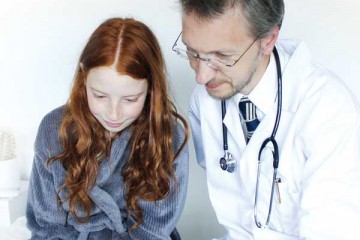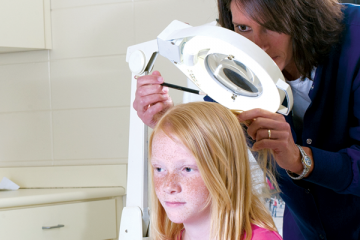Free 24/7 Nurse Advice Line: 844-GET-CHOC.
Chronic Constipation in Kids
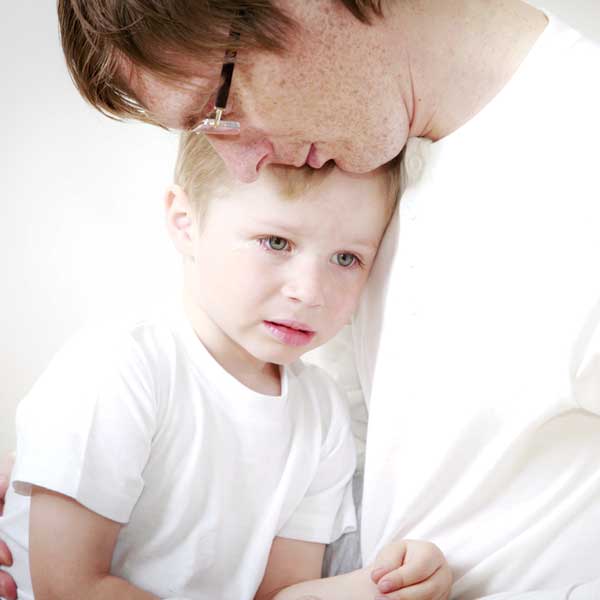
What is Constipation?
Constipation is a decrease in the frequency of bowel movements, compared to a person or child’s usual pattern. How often a child makes a bowel movement varies. Generally, a person is considered to be constipated when bowel movements result in passage of small amounts of hard, dry stool, usually fewer than three times a week.
Causes of Irregular Stool
Normally, as food moves through the colon (also known as the large intestine) the colon absorbs water while forming stool (waste products). Muscle contractions then push the stool toward the rectum, and, by the time the stool reaches the rectum, most of the water has been absorbed, making the stool solid. When the colon’s muscle contractions are slow or sluggish, the stool moves through the colon too slowly, resulting in too much water being absorbed. Additionally, if a child is dehydrated, more water will be taken from the colon to provide water to the vital organs, resulting in harder stool.
Ideally, children should have soft bowel movements each day and should resemble Type 4 on the Bristol Stool Chart.
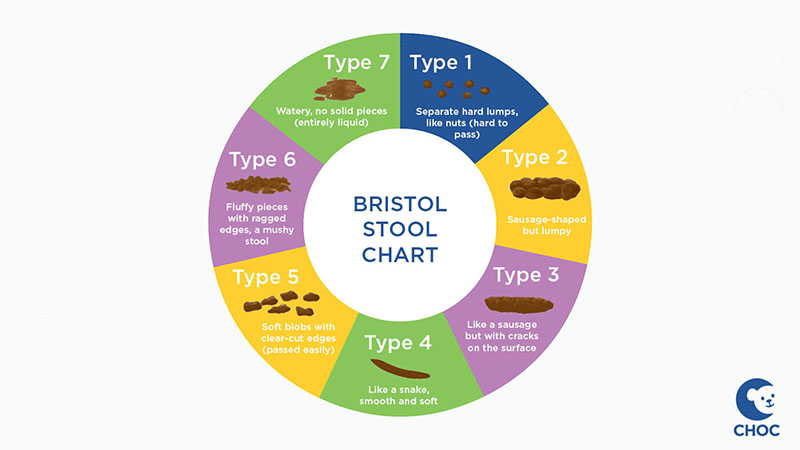
Symptoms of Constipation
Constipation can be experienced differently in each child’s body. However, symptoms the child may experience include:
- Less than three bowel movements per week.
- At least one episode of stool leakage per week
- Withholding behavior
- Difficult, painful or hard bowel movements
- Small “ball like” stool
- Feeling bloated or uncomfortable
- Large diameter stools that could clog the toilet
- Presence of a large stool mass in the abdomen or rectum.
Constipation Treatment at CHOC
Constipation is a common problem that can make kids – and their parents – miserable. “I think I have changed more lives by treating constipation than any other condition,” says Dr. Mitchell Katz, a CHOC pediatric gastroenterologist. The treatment for chronic constipation is three-fold, says Dr. Katz:
- The child’s blockage has to be cleared
- The child needs to be kept unblocked by undoing what she has learned that led her to be constipated. The way to do this is by using stool softeners, so making a bowel movement is painless. “You keep the stool soft so you can guarantee to the child that pooping does not hurt,” says Dr. Katz.
- The child needs to be toilet trained again using behavior modification techniques and rewards.
When to See a Doctor for Constipation
Chronic constipation is usually painful and causes the child great discomfort. If your child suffers from chronic constipation, it’s time to take him to the doctor when:
- Episodes of constipation last longer than three weeks and dietary changes or adding hydration has not helped.
- The parents can’t relieve the child’s pain.
- The child is unable to participate in normal activities because of constipation.
- The child soils his clothes.
- The child develops abdominal pain or swelling that could be a sign of another medical problem.
- If there is blood in the stool
Meet Dr. Katz - Expert in Pediatric Gastroenterology
An internationally recognized expert in pediatric gastroenterology, Dr. Katz serves as director of CHOC’s Multidisciplinary Feeding Program, Pediatric Gastrointestinal Lab Services and the division of Pediatric Gastroenterology and Nutrition. On the forefront of pediatric gastroenterology research and innovative treatments, Dr. Katz and his team are involved in a number of clinical trials testing medications for inflammatory bowel disease and gastroesophageal reflux disease (GERD). Dr. Katz completed medical school at State University of New York at Downstate Medical School, his internship and residency at Mount Sinai Hospital and his fellowship in pediatric gastroenterology and nutrition at the University of California, San Francisco.
Dr. Katz’s philosophy of care: “I believe that the care of children should be provided in a family-centered, compassionate manner, taking into consideration the needs of not just the child but the family dynamic across the continuum.”
Board Certifications:
Pediatrics
Pediatric Gastroenterology

Dr. Mitchell H. Katz
CHOC Gastroenterologist
Understanding Stomach Pain in Children
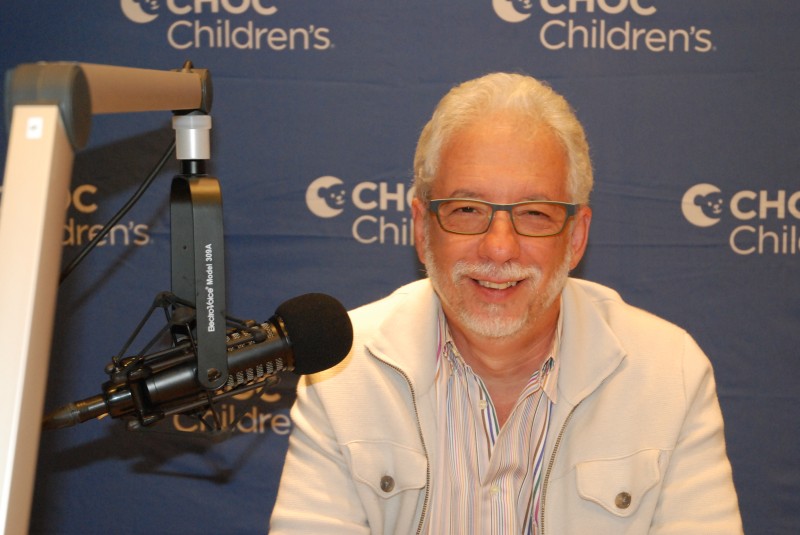
CHOC Pediatric Gastroenterologist Dr. Mitchell Katz talks with CHOC Radio host Bryan Mundia about the symptoms of stomach aches and pains in children. Dr. Katz says that all pain is real and parents are the key in understanding why their child might be in pain. Dr. Katz also discusses the red flags that may be indicators of potentially more serious gastrointestinal issues.
Knowledge is the best medicine. Learn more about your child's health in these features from the experts at CHOC.
Dental Hygiene
Poor oral health can cause problems with feeding in babies and also harm a child’s overall health, development and school performance. Learn more in this health feature.
Health Information on the Web
An electronic health record is a computerized collection of a patient’s health records designed to be shared among a patient’s health care providers. Learn more about the EMR in this health feature.

